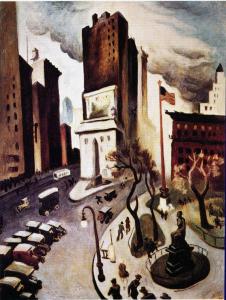
Source: Wikimedia
License: Public Domain
Before there was Superbad (2007), there was The Daytrippers (1997). Director Greg Mottola’s debut feature feels like a predecessor to Juno (2007), not a movie with a major character who calls himself McLovin. The dialogue is ironic and self-effacing. The characters embody generational conflict, rather than the harmony of twenty-something cops partying with an errant teenager. Whit Stillman probably likes this movie. And so do I (mea culpa)—at least up to a point.
The titular trip concerns five relations: Jim and Rita Malone (Pat McNamara and Anne Meara), their daughters—Eliza and Jo (Hope Davis and Parker Posey), and Jo’s boyfriend, Carl (Liev Schrieber). Eliza has found a note while cleaning the house, a note inscribed with an Andrew Marvell poem from a certain “Sandy.” While she is in denial, her family suspects her husband Louis (Stanley Tucci) of cheating. He’s gone off to work despite the proximity to Christmas. And so, this family of Long Island (pronounced Lawn-GUY-land) natives sets off to New York City, heater broken and hearts set on unraveling a good, old-fashioned mystery (how much and to whom Eliza and her feelings matter is less clear).
Here we have a group of misfits both broadly recognizable and oddly specific. Carl, for example, works in construction but gleefully spills the beans every time Rita asks about his novel. A terrifically original indictment of our times, his book concerns a dog-headed man (a German Shorthaired Pointer, if you must know) who “points” to what’s wrong with us. The aspiring snob for whom the artistic world has no time is not a particular-to-New York type. But the drama of the character comes from his kindness toward the family, held in balance with his nigh-fascist political opinions and his uncool obsession with (and rejection by) the New York literary establishment. Rita, for her part, is overbearing in that Italian-American motherly sort of way: always meddling and yelling, though (at least in most types I’ve met in real life) not without genuine concern. Based on Roger Ebert’s review of the movie, I assume they don’t tend this cultivar much out Chicago way. Jo, escaping the family, goes to college in the Midwest; she is only home for Christmas break, during which she looks forward to nothing more than smoking cigarettes and making wry jokes.
Road movies rise or fall based on their characters, and this formation ain’t half bad. A good cast and solid writing don’t hurt in a mystery either. And so at the level of entertainment, The Daytrippers is successful. We peak into life at Louis’ office at a literary agency, overhearing a desperate colleague regale an uninterested author about a recent one night stand. Rita faints chasing a taxi, only for a 22-year-old who looks like a 48-year-old (in that classic 90s way) and his deadbeat dad to come to the rescue. Eliza finds herself at a party, trapped in a corner with a woman drinking like a fish and paranoidly giggling about her ex. All the adorning material highlights the film’s central theme: relationships, how they break and how they cohere.
Just as this promising flick builds to a triumphant ending, however, it veers off track. In the last 20 minutes or so, it decides that one of the characters is the reason for the group’s emerging disunity. In the parlance of ours times, they’re a narcissist, whose toxic presence makes boundary-making impossible (man, is it hard to write like that). Everyone else loves each other; this person’s “love” is little more than poisoned brew.
I didn’t buy it. One could, of course, soften the blow and say that all of the characters have flaws that lead to final implosion and reconstruction. But that just is not what the movie says. It goes character by character and shoves in our face just how vile this one person is and how it affects everyone else. I don’t even particularly like this character. Pinning everything so squarely on one personage feels cheap, however, especially from a film that is otherwise so concerned with the complexity of human emotions and relationships. 75 minutes of jokes met with believable emotional pain should not be reduced to one person’s flaws. It feels rushed, like they had the rest written and had to figure out not simply the original mystery but also the whodunit at the heart of the film’s emotional turbulence.
I can’t help but compare The Daytrippers to John Cassavetes’ A Woman Under the Influence (1974). That too is a movie about emotional and psychic disintegration set in a world with no privacy. It seeks no answers, but lays bare the psychic wounds that we inherit, give, receive, mitigate, and deepen. Cassavetes’ movie descends into a twist in its final act. But the twist is as emotionally complicated as the rest of the film has been. The Daytrippers rushes to leave one character holding the bag.













